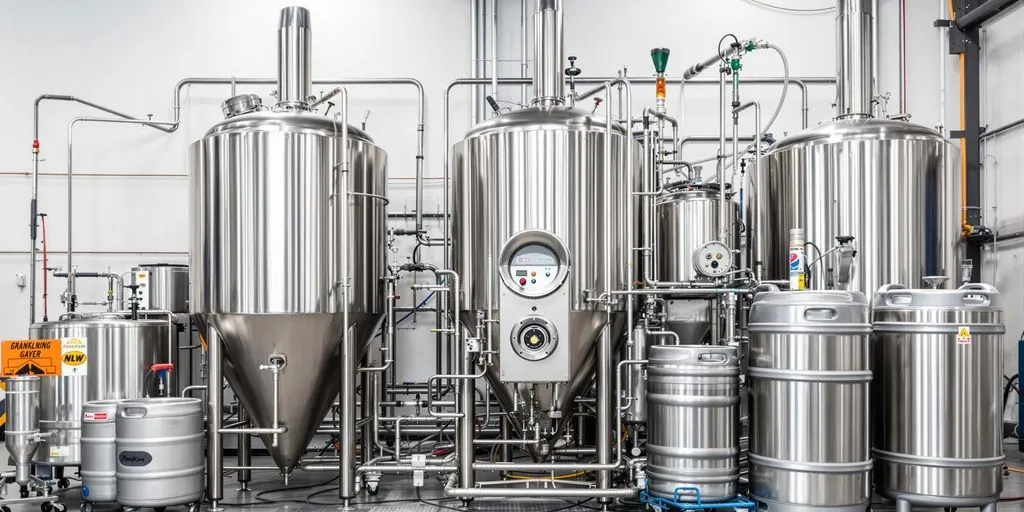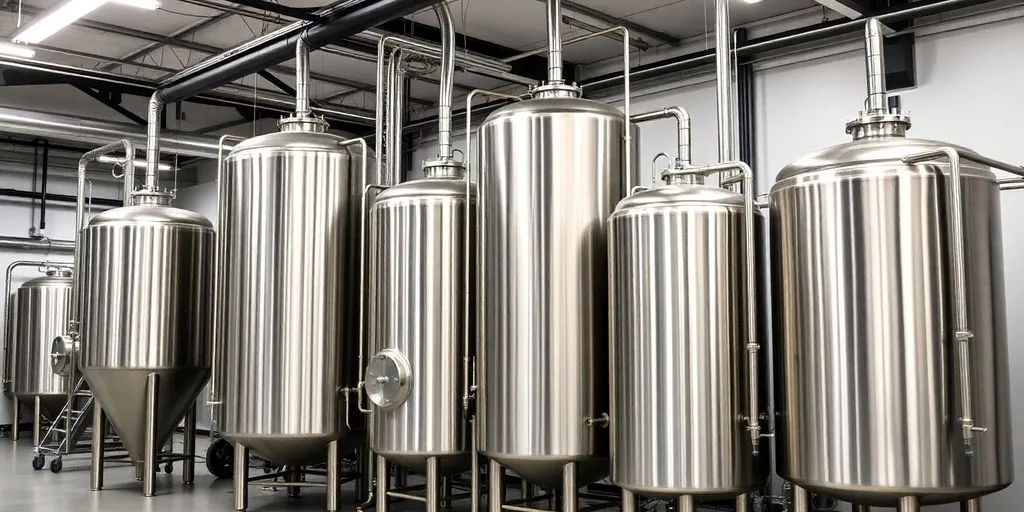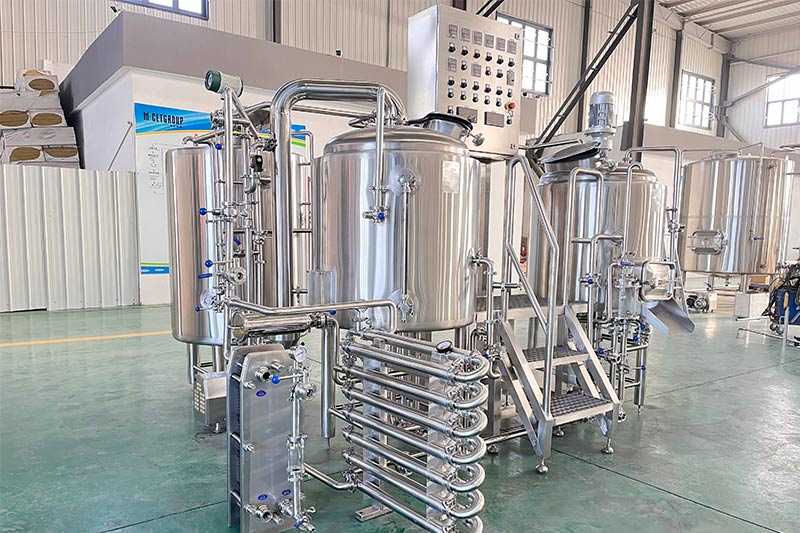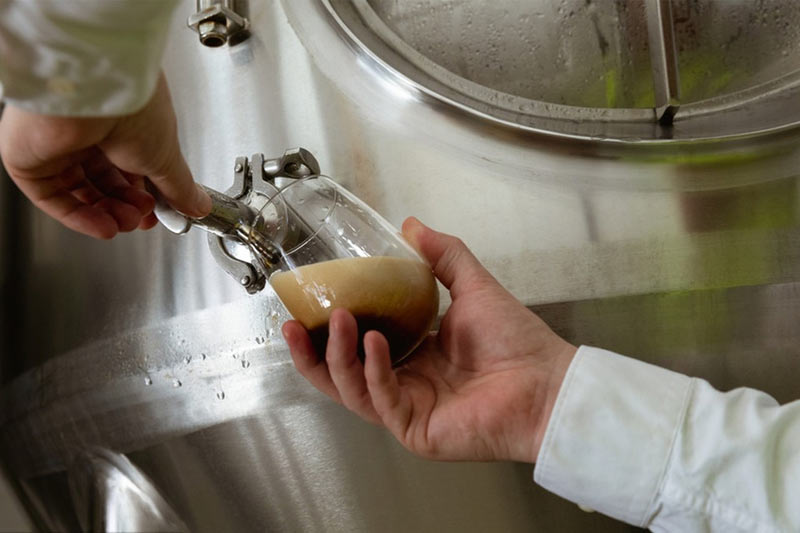Brewing good beer is both an art and a science. For aspiring brewers and established breweries alike, understanding commercial brewing equipment is crucial. This comprehensive guide delves into the essentials of brewing equipment and supplies, providing insights that can elevate your brewing process. Whether you’re a home brewer looking to scale up or a professional seeking to refine your techniques, this article is worth reading.

What Is Commercial Brewing Equipment and Why Is It Essential?
Commercial brewing equipment refers to the machinery and tools used to produce beer on a large scale. Unlike home brewing setups, commercial equipment is designed for efficiency, consistency, and scalability.
Why it’s essential:
- Consistency: Ensures each batch of beer meets quality standards.
- Efficiency: Streamlines the brewing process, saving time and resources.
- Scalability: Allows brewers to increase production to meet demand.
Investing in high-quality commercial brewing equipment is a significant step toward producing good beer that stands out in the market.
Explore our range of commercial brewery equipment designed for every brewer’s needs.
How to Choose the Right Brewhouse for Your Brewery
What is a Brewhouse?
A brewhouse is the heart of a brewery where the brewing process begins. It comprises vessels like mash tuns, kettles, and lauter tuns.
Factors to Consider
- Size and Capacity: Determine your production goals.
- Configuration: Choose between 2-vessel, 3-vessel, or 4-vessel systems.
- Material: Opt for stainless steel brewing equipment for durability and sanitation.
Questions to Ask
- How much space do I have for the brewhouse?
- What is my target production volume?
- Do I need automation in my brewing system?
Find the perfect brewhouse equipment tailored to your brewery’s needs.
Why Stainless Steel Is the Gold Standard in Brewing Equipment
Stainless steel is the preferred material in brewing for several reasons:
- Durability: Resistant to corrosion and can withstand rigorous use.
- Sanitation: Non-porous surface prevents bacterial growth.
- Temperature Resistance: Ideal for hot processes like mashing and boiling.
Using 304 stainless steel brewing equipment ensures longevity and maintains the purity of your brew.
The Importance of Grain Mills in Brewing Good Beer
What Is a Grain Mill?
A grain mill crushes malted grains, allowing enzymes to convert starches into fermentable sugars during mashing.
Benefits
- Efficiency: Improves extraction rates.
- Consistency: Ensures uniform grain size for predictable results.
- Control: Adjust the crush to suit different beer styles.
Investing in a quality grain mill is crucial for any brewer aiming for quality brewing.
Mastering the Mash: Understanding Mash Tuns
What Is a Mash Tun?
A mash tun is a vessel where grains are mixed with water at specific temperatures to extract sugars.
Key Features
- Insulation: Retains heat for consistent mashing temperatures.
- Material: Stainless steel with a jacket for temperature control.
- Design: Includes a false bottom for efficient wort separation.
A well-designed mash tun contributes significantly to producing good beer.
Fermenters vs. Conical Fermenters: What’s the Difference?
Fermenters
Standard fermenters are tanks where wort ferments into beer.
Conical Fermenters
Conical fermenters have a cone-shaped bottom, allowing for easy yeast and sediment removal.
Advantages of Conical Fermenters
- Ease of Cleaning: Sediments settle at the bottom for easy discharge.
- Reusability of Yeast: Harvest yeast for future batches.
- Improved Beer Quality: Reduces exposure to dead yeast cells.
Upgrade to conical fermenters for professional-level brewing.
Optimizing Your Kettle for Better Wort Production
The Role of the Kettle
A kettle is used for boiling the wort, which is crucial in extracting flavors and sterilizing the brew.
Key Considerations
- Heating Method: Electric or steam-heated kettles provide precise temperature control.
- Material: Stainless steel for durability and heat conductivity.
- Features: Whirlpool fittings for wort clarification.
An efficient kettle enhances the brewing process, leading to better beer.

Insulation Techniques for Efficient Brewing
Insulating your brewing vessels is vital for maintaining temperatures during brewing.
Benefits
- Energy Efficiency: Reduces heat loss, saving energy.
- Temperature Control: Critical for processes like mashing and fermentation.
- Consistency: Achieves uniform results batch after batch.
Common insulation materials include rock wool and polyurethane. Well-insulated equipment is a hallmark of quality brewing equipment.
From Home Brew to Pro Brewing: Scaling Up Your Craft
Challenges of Scaling Up
- Equipment Needs: Transitioning to commercial brewing equipment.
- Regulatory Compliance: Meeting industry standards and regulations.
- Process Adaptation: Adjusting recipes and processes for larger volumes.
Steps to Take
- Educate Yourself: Understand the differences between home and commercial brewing.
- Plan Your Brewery Design: Consider workflow and space utilization.
- Invest Wisely: Choose equipment that meets current needs and allows for future growth.
Our one-stop shop offers everything you need to start a brewery.
Essential Fittings and Kegs for Commercial Breweries
Fittings
High-quality fittings are essential for a sanitary brewing environment.
- Tri-Clamp Fittings: Provide secure, leak-proof connections.
- Valves and Gauges: Monitor and control the brewing process.
- Sight Glasses: Observe fluid levels and flow.
Kegs
Proper kegs are crucial for storage and distribution.
- Material: Stainless steel kegs are standard for durability.
- Sizes: Various sizes to suit different distribution needs.
- Maintenance: Regular cleaning to ensure beer quality.
Investing in the right fittings and kegs contributes to the overall success of your brewery.
Home Brew vs. Pro Brewing: What’s the Difference?
While home brew is a fantastic hobby, pro brewing elevates the craft to a business level.
Key Differences
- Scale of Production: Larger batches in pro brewing.
- Quality Control: More stringent processes to ensure consistency.
- Equipment Complexity: Advanced systems like brewing systems and commercial beer brewing equipment.
Transitioning requires not just passion but also an understanding of the brewing solutions suitable for commercial success.
FAQs
A: 304 stainless steel offers excellent corrosion resistance, durability, and ease of cleaning, making it ideal for brewing equipment where hygiene and longevity are paramount.
A: A conical fermenter allows yeast and sediment to collect at the bottom, making it easier to remove them. This design improves beer clarity and simplifies yeast harvesting for future batches.
A: While some principles apply, commercial brewing requires specialized commercial brewing equipment, adherence to regulations, and often a significant investment. Scaling up involves more than just increasing batch sizes.
A: Key supplies include a brewhouse system, fermenters, a grain mill, kettles, fittings, kegs, and quality raw materials like malt and hops.
A: Working with experienced manufacturers like us ensures you get high-quality commercial brewing equipment designed to meet your specific needs. Work with us to start your brewing journey.
Conclusion
Key Takeaways
- Invest in Quality Equipment: Essential for producing good beer consistently.
- Understand Your Equipment: Knowledge of how each piece works enhances the brewing process.
- Scale Thoughtfully: Transitioning to commercial brewing requires careful planning and investment.
- Stay Informed: Continual learning leads to better brewing practices.
By mastering your commercial brewing equipment and utilizing the right supplies, you can produce beer that delights customers and stands out in the market.

Ready to take your brewing to the next level? Discover our range of brewing solutions designed for brewers of all types.
Quick Summary
- Commercial Brewing Equipment: Essential for scaling up and ensuring consistency.
- Brewhouse Selection: Choose based on capacity, configuration, and material.
- Stainless Steel Benefits: Durability and sanitation are key.
- Grain Mills: Crucial for efficient sugar extraction.
- Mash Tuns: Insulation and design impact the brewing process.
- Conical Fermenters: Improve beer quality and simplify yeast management.
- Kettles: Optimizing features enhances wort production.
- Insulation: Vital for temperature control and energy efficiency.
- Scaling Up: Requires strategic planning and investment.
- Fittings and Kegs: Essential components for a functional brewery.
With decades of experience in the industry, we’re your trusted partner in brewing. Work with us to craft the perfect brewing setup for your needs.

